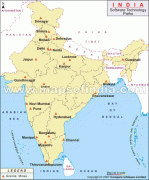 India seems to be going through a new era in high-tech – whether it is in software, with new product entrepreneurs emerging in huge numbers, or electronics and telecoms which are both in the process of having new national policies formulated.
India seems to be going through a new era in high-tech – whether it is in software, with new product entrepreneurs emerging in huge numbers, or electronics and telecoms which are both in the process of having new national policies formulated.
There is certainly a wave of enthusiasm among technology businesses, and among policy-makers who want to create the environment for Indian companies to both serve the growing domestic market in India as well as take on traditional multinationals in global markets.
Indian tech companies are now talking about ‘inventing the future’. There’s talk of creating at least one $1-billion tech IPO per year in coming years. Companies like Flipkart (India’s version of Amazon.com), InMobi (a US-funded mobile ad network with a growing presence in the UK), Zoho, and SnapDeal (India’s equivalent to Groupon) feature among this list.
According to India’s software industry association NASSCOM, the software products industry in India has shown growth of 22 per cent for the past five years – evidence that the Indian software product industry is entering a new era, beyond simply outsourcing or offshoring. There are now around 2,400 organisations contributing $2 billion to the overall software industry revenues, enabling India to emerge as a global software products hub (as opposed to just being a BPO or business process outsourcing hub).
Innovation-driven start up activity has seen more than 1,110 organisations incorporated in the last five years in India focused on the mobility, small-to-medium sized business, e-commerce and education sectors. There are currently six major product segments, 30 significant geographical centres for product firms and 46 product categories. In the last year itself, the market has witnessed the launch of new ventures, healthy market capitalisation and an increased focus on the domestic market, all of which are ushering in the next wave of growth for Indian software products.
A level playing field for Indian global start-ups
The fact that the entry costs for a software product start-up are now similarly low whether you are in India, the UK or the USA, means that there is a level playing field for Indian tech start-ups. That’s because they are able to exploit emerging, disruptive and innovative technologies such as cloud computing, mobility, sustainability, social networking and virtualisation. The cloud especially has made it easier for product start-ups to market and deliver their products effectively and address a global audience from day one, especially using SaaS (software as a service) as the model.
In India, product firms have grown the fastest in tier II and tier III cities – leading to product start-ups now setting up in places like Mysore, Visakhapatnam, Thiruvananthapuram, Coimbatore, Kochi, Ahmedabad and Chandigarh. The combination of improved connectivity and Internet access, a large untapped consumer base and availability of manufacturing clusters is making many of these cities a great foothold for new tech start-ups to grow organically, first locally and then nationally and internationally.
Indian tech and software product start-ups are fired up and looking at all kinds of areas – at a conference in Bangalore last month, Silicon Valley veteran Vinod Khosla (co-founder of Sun Microsystems) told an audience of over 1,400 – comprising new and fast growing young Indian tech entrepreneurs – that opportunities for them existed in many emerging areas and listed 12 at least to note for possible new product ventures in consumer retail: these include data reduction, big data analytics, emotion-based businesses, education, TV 2.0, ‘Social next’ (ie: next generation Facebook), identifying consumer interests, NFC (near field communications), democratisation of publishing, utilities, healthcare and marketplaces. The future, he said, would be based on:
– Broader access (eg. via Internet, mobile)
– A post-PC era
– New social behaviour (eg. Facebook and Twitter)
– Consumerisation of technology
– Economic efficiency
It’s clear that there is a buzz in India’s tech scene. Having spent time with a product start-up in the Silicon Valley in the dot com boom of the late 90s, it’s evident that the energy and go-getting atmosphere that was there in the US and Europe at that time is being relived with even more vigour in India. It’s not just Bangalore that’s emerging as the next Silicon Valley – but many cities in India.
Indian tech start-ups, and particularly software product start-ups, are thinking global from day one – and are dreaming of creating billion dollar companies. The combination of inspirational role models returning from Silicon Valley, the high visibility of already successful new generation Indian tech start-ups, an improved environment for tech start-ups both in terms of the start-up ecosystems and clusters as well as the development of improved Internet/wireless connectivity (3/4G, LTE and broadband) are all contributing to creating a new era in the Indian technology sector. The confidence of this sector and the nexus of networks mean that they are also able to gain a lead in markets beyond the US and Europe – into Brazil, Africa and China. This will provide both opportunities and competition for companies in the UK, US and other traditional developed markets.
In summary, the next generation of Indian high-tech companies is entering mainstream global markets. They are not based on the traditional Indian model of providing low cost software and engineering services. They have taken this a step further and developed software and technology products that stand up and compete against the current global technology product leaders.
There is drive and enthusiasm among India’s young tech entrepreneurs to compete both locally and globally. They know about developing quality products that provide value for money. It’s something that the world’s tech industry needs to be aware of and either figure out how to take advantage of this through partnership, or watch as the Indian companies gain market dominance.
For a perspective on places around the world competing to be the next Silicon Valley, visit: www.thenextssiliconvalley.com
 Nitin Dahad is CEO and Publisher of The Next Silicon Valley. A long-time consultant and adviser in the electronics, semiconductors and wireless industry for over 25 years, he’s worked in various roles throughout his career with large corporations as well as start-ups globally – particularly the UK, US and India. He is the brain behind a number of successful technology and B2B publications.
Nitin Dahad is CEO and Publisher of The Next Silicon Valley. A long-time consultant and adviser in the electronics, semiconductors and wireless industry for over 25 years, he’s worked in various roles throughout his career with large corporations as well as start-ups globally – particularly the UK, US and India. He is the brain behind a number of successful technology and B2B publications.